Early Christian Writings 2
Chris Knepp
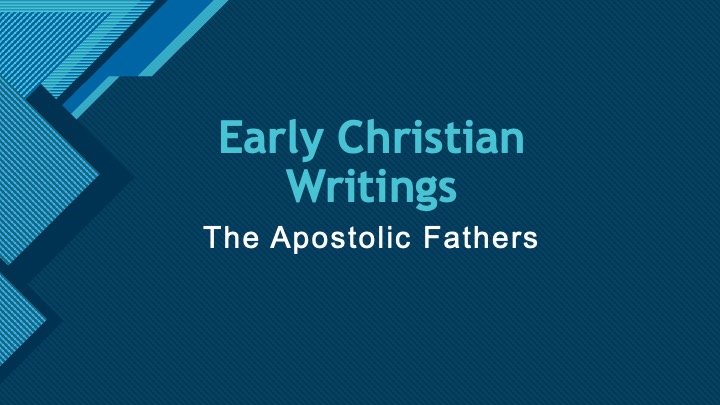
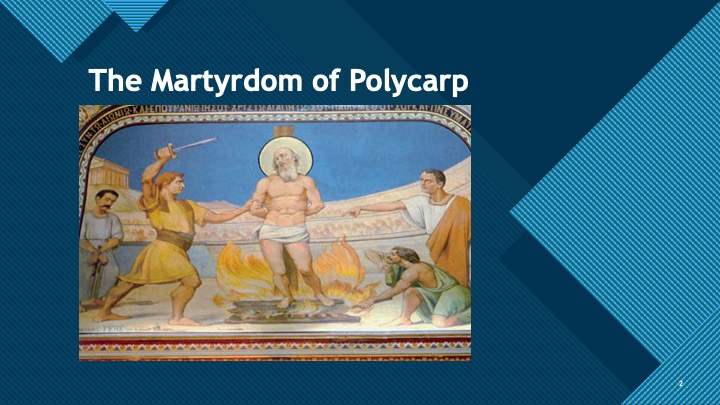
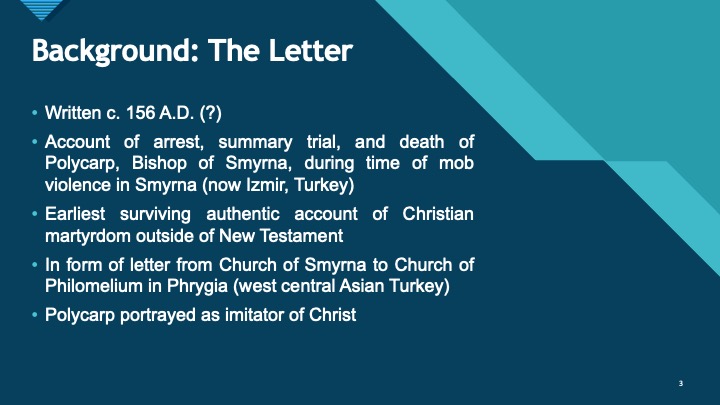
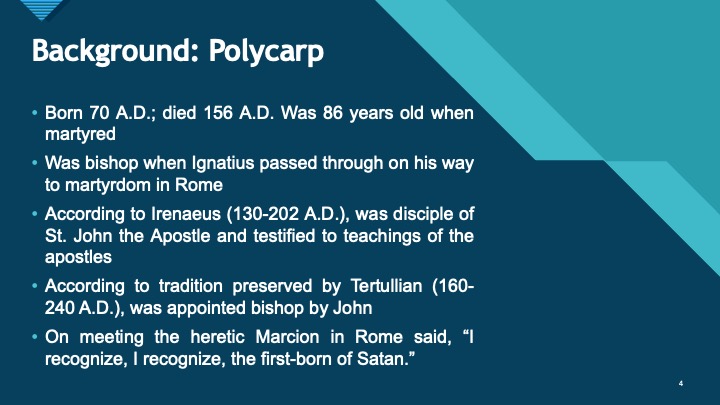
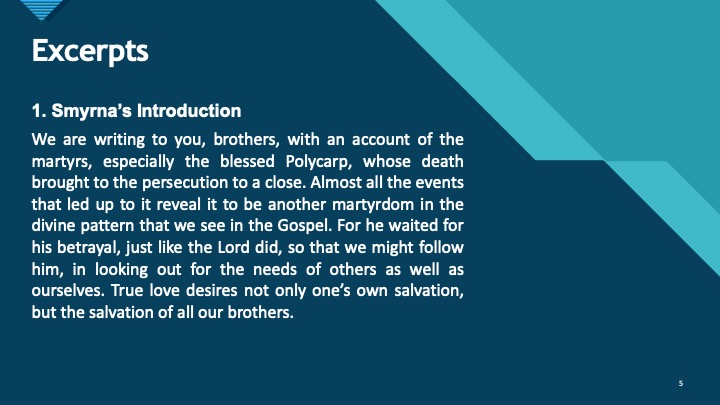
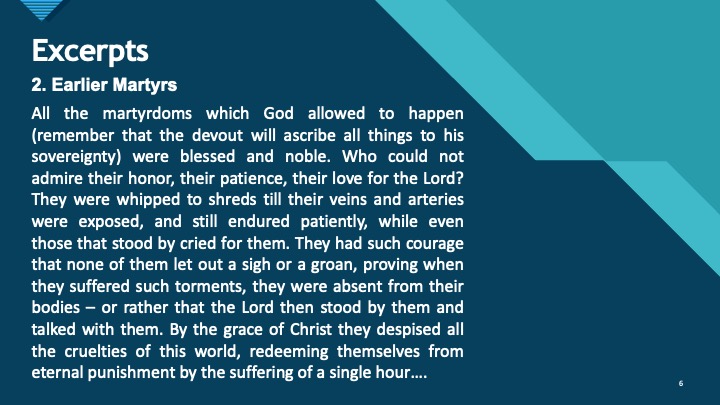
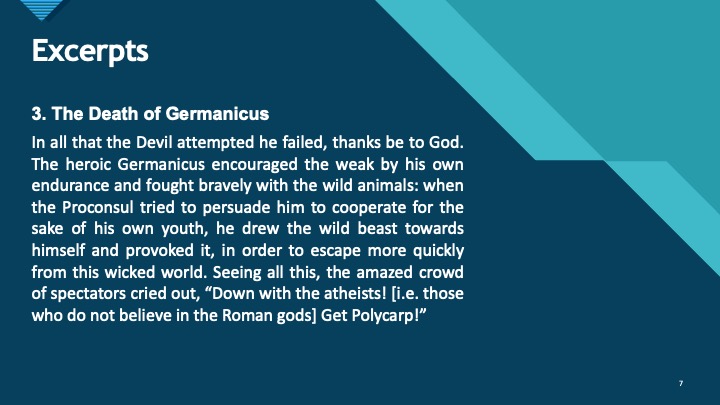
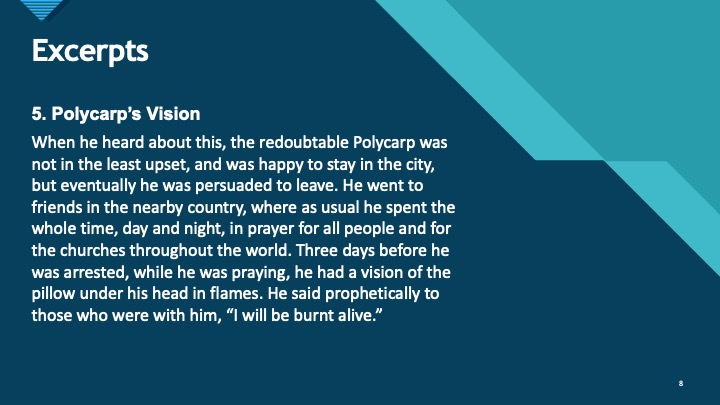
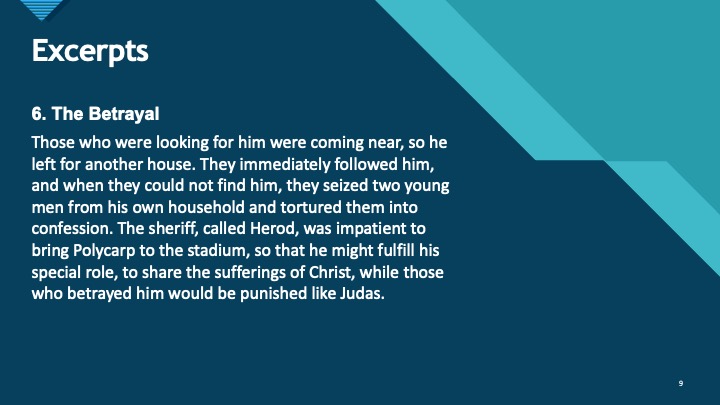
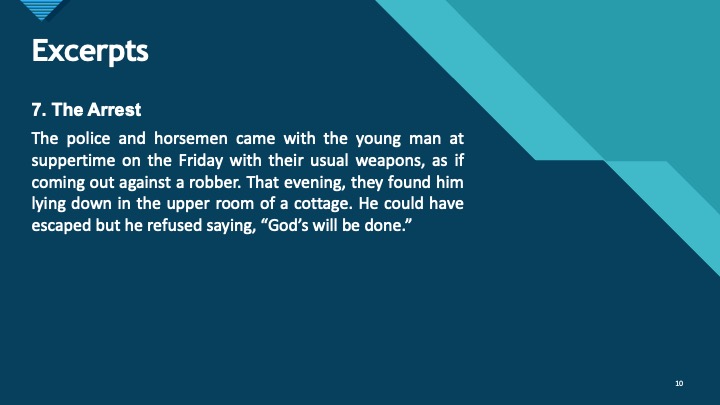
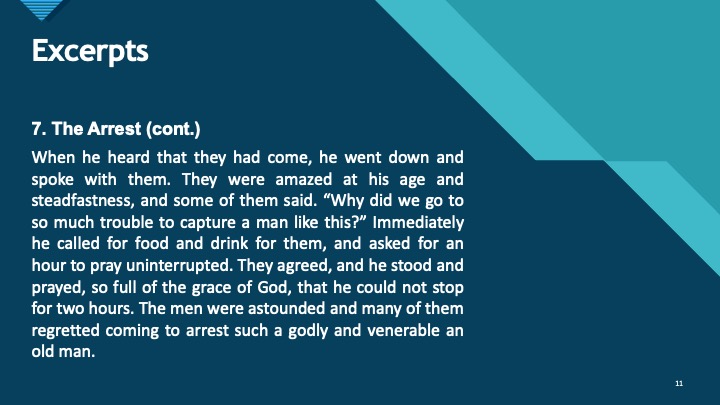
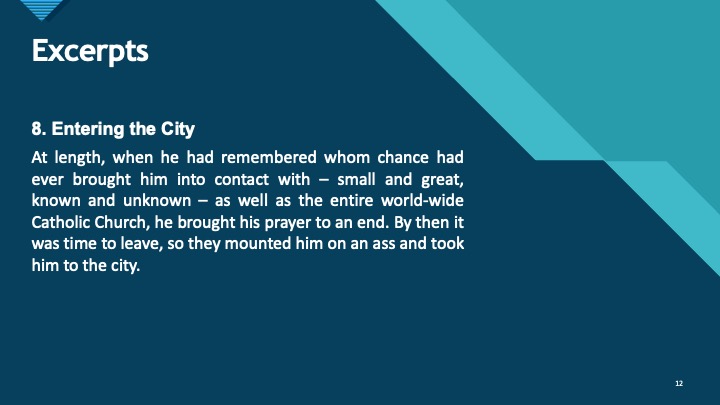
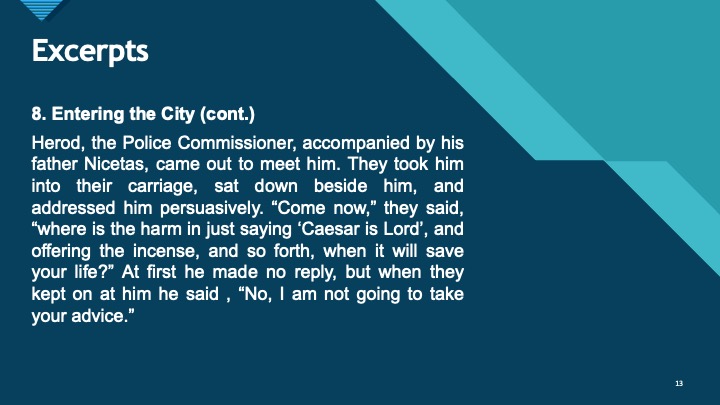
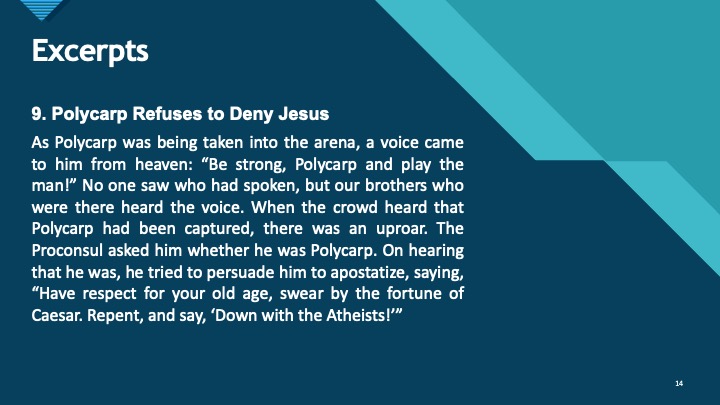
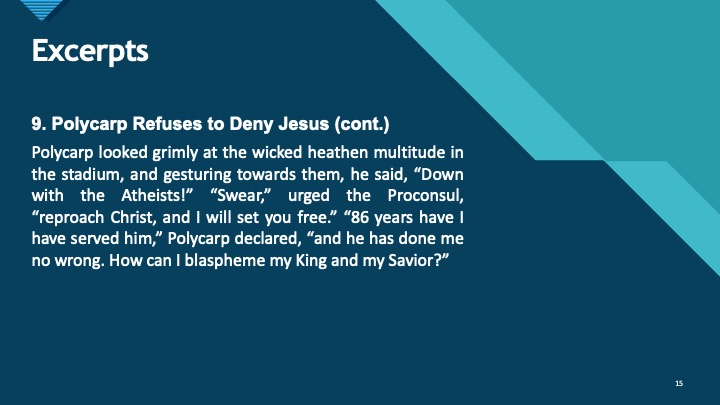
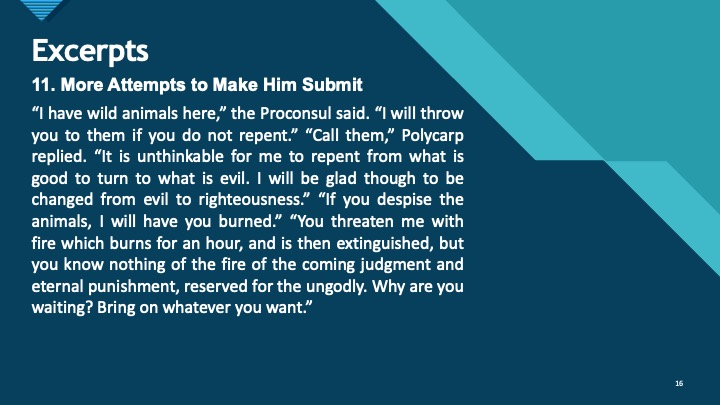
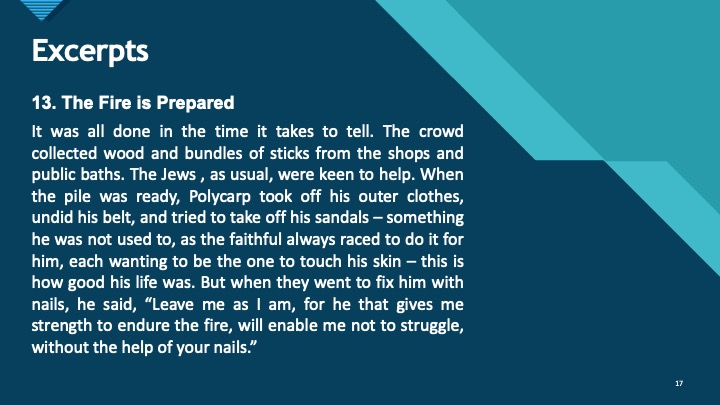
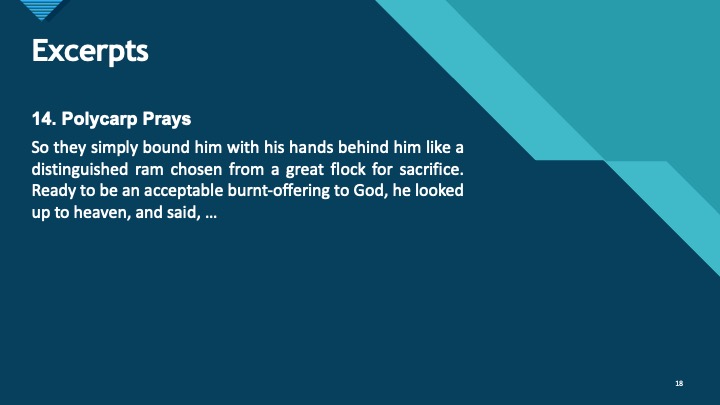
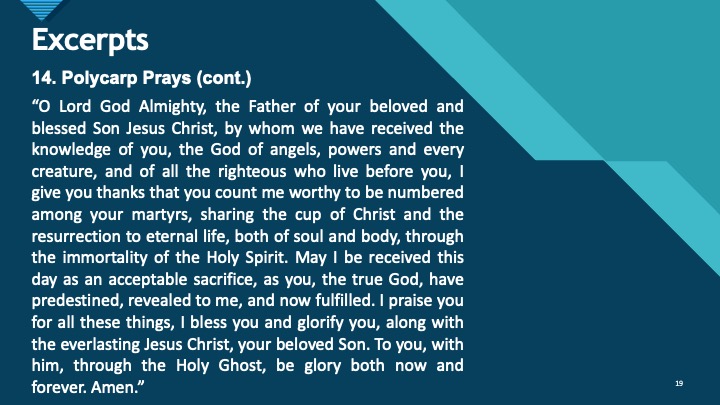
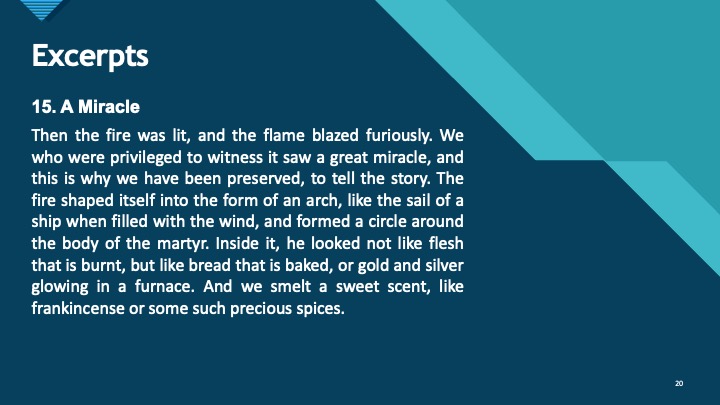
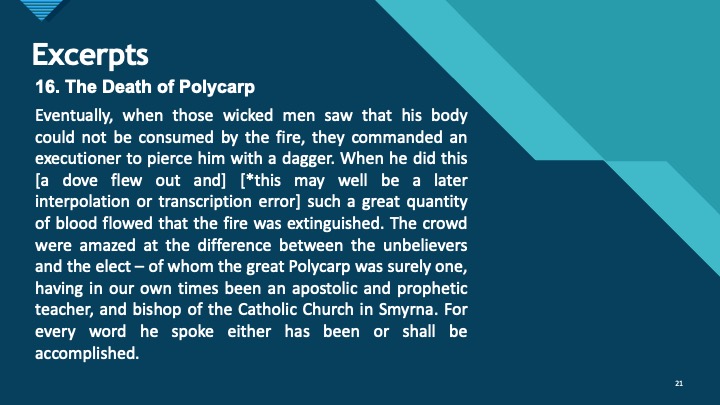
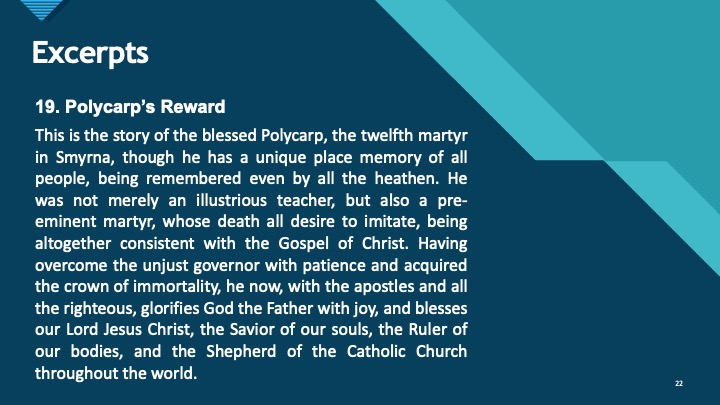
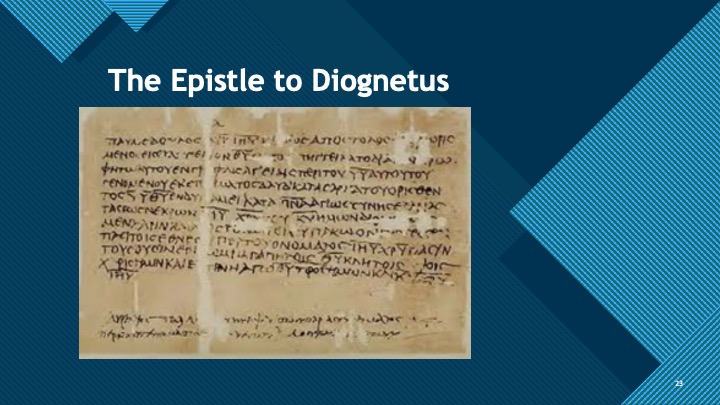
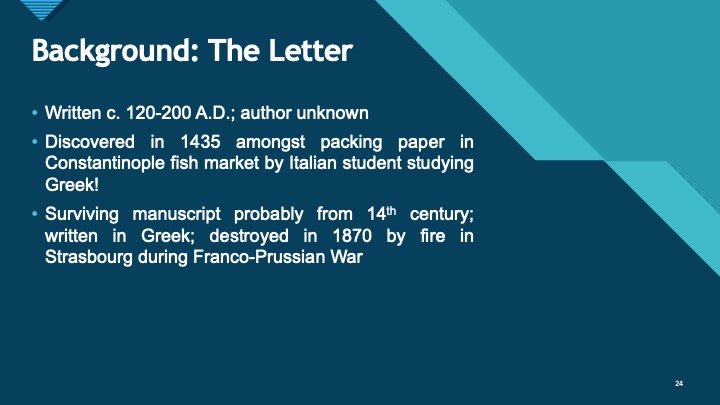
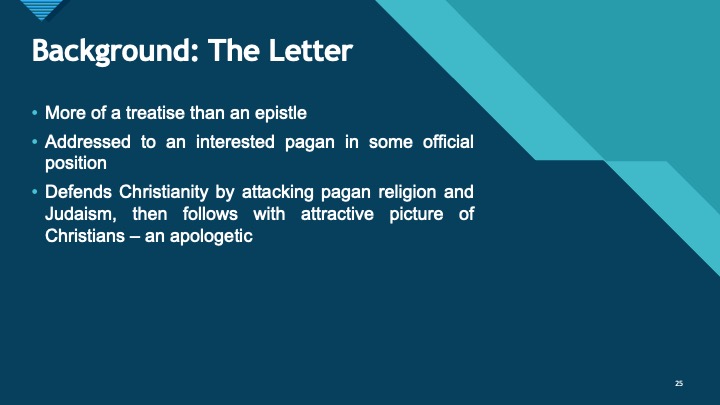
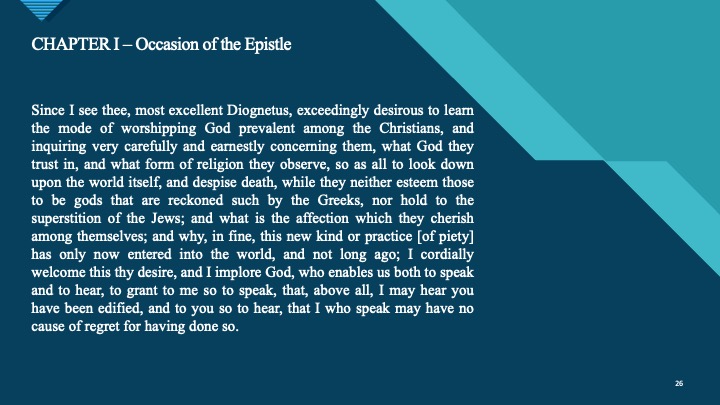
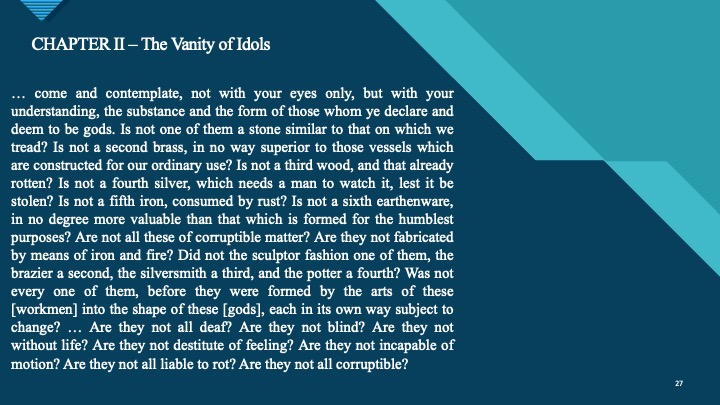
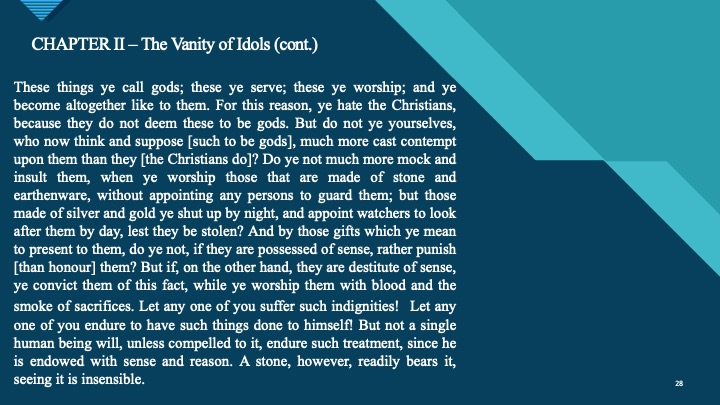
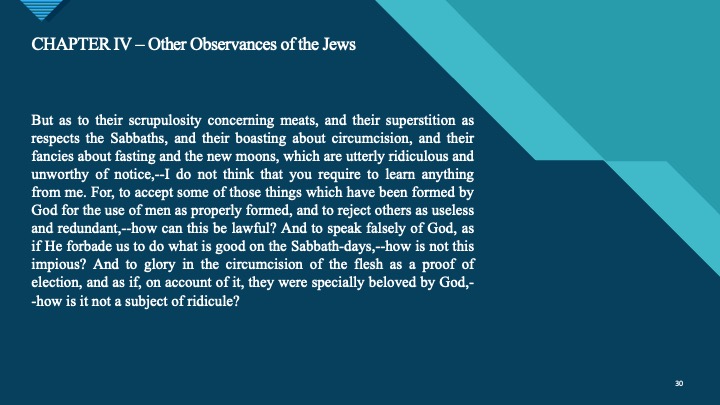
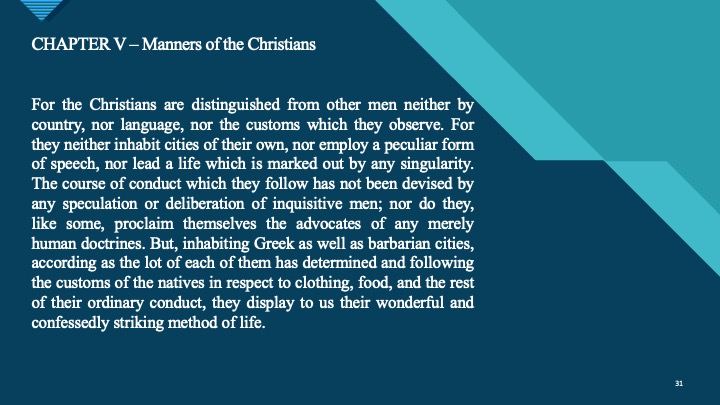
Early Christian Writings 2
Links
< Home Page > < Early Christian Writings Menu > < Top of Page >
Early Christian Writings Text
Early Christian Writings
The Apostolic Fathers
The Martyrdom of Polycarp
Background: The Letter
• Written c. 156 A.D. (?)
• Account of arrest, summary trial, and death of Polycarp, Bishop of Smyrna, during time of mob violence in Smyrna (now Izmir, Turkey)
• Earliest surviving authentic account of Christian martyrdom outside of New Testament
• In form of letter from Church of Smyrna to Church of Philomelium in Phrygia (west central Asian Turkey)
• Polycarp portrayed as imitator of Christ
Background: Polycarp
• Born 70 A.D.; died 156 A.D. Was 86 years old when martyred
• Was bishop when Ignatius passed through on his way to martyrdom in Rome
• According to Irenaeus (130-202 A.D.), was disciple of St. John the Apostle and testified to teachings of the apostles
• According to tradition preserved by Tertullian (160-240 A.D.), was appointed bishop by John
• On meeting the heretic Marcion in Rome said, “I recognize, I recognize, the first-born of Satan.”
Early Christian Writings
Excerpts\
1. Smyrna’s Introduction
We are writing to you, brothers, with an account of the martyrs, especially the blessed Polycarp, whose death brought to the persecution to a close. Almost all the events that led up to it reveal it to be another martyrdom in the divine pattern that we see in the Gospel. For he waited for his betrayal, just like the Lord did, so that we might follow him, in looking out for the needs of others as well as ourselves. True love desires not only one’s own salvation, but the salvation of all our brothers.
2. Earlier Martyrs
All the martyrdoms which God allowed to happen (remember that the devout will ascribe all things to his sovereignty) were blessed and noble. Who could not admire their honor, their patience, their love for the Lord? They were whipped to shreds till their veins and arteries were exposed, and still endured patiently, while even those that stood by cried for them. They had such courage that none of them let out a sigh or a groan, proving when they suffered such torments, they were absent from their bodies – or rather that the Lord then stood by them and talked with them. By the grace of Christ they despised all the cruelties of this world, redeeming themselves from eternal punishment by the suffering of a single hour….
3. The Death of Germanicus
In all that the Devil attempted he failed; thanks be to God. The heroic Germanicus encouraged the weak by his own endurance and fought bravely with the wild animals: when the Proconsul tried to persuade him to cooperate for the sake of his own youth, he drew the wild beast towards himself and provoked it, to escape more quickly from this wicked world. Seeing all this, the amazed crowd of spectators cried out, “Down with the atheists! [i.e. those who do not believe in the Roman gods] Get Polycarp!”
5. Polycarp’s Vision
When he heard about this, the redoubtable Polycarp was not in the least upset, and was happy to stay in the city, but eventually he was persuaded to leave. He went to friends in the nearby country, where as usual he spent the whole time, day and night, in prayer for all people and for the churches throughout the world. Three days before he was arrested, while he was praying, he had a vision of the pillow under his head in flames. He said prophetically to those who were with him, “I will be burnt alive.”
6. The Betrayal
Those who were looking for him were coming near, so he left for another house. They immediately followed him, and when they could not find him, they seized two young men from his own household and tortured them into confession. The sheriff, called Herod, was impatient to bring Polycarp to the stadium, so that he might fulfill his special role, to share the sufferings of Christ, while those who betrayed him would be punished like Judas.
7. The Arrest
The police and horsemen came with the young man at suppertime on the Friday with their usual weapons, as if coming out against a robber. That evening, they found him lying down in the upper room of a cottage. He could have escaped but he refused saying, “God’s will be done.”
7. The Arrest (cont.)
When he heard that they had come, he went down and spoke with them. They were amazed at his age and steadfastness, and some of them said. “Why did we go to so much trouble to capture a man like this?” Immediately he called for food and drink for them, and asked for an hour to pray uninterrupted. They agreed, and he stood and prayed, so full of the grace of God, that he could not stop for two hours. The men were astounded and many of them regretted coming to arrest such a godly and venerable an old man.
8. Entering the City
At length, when he had remembered whom chance had ever brought him into contact with – small and great, known and unknown – as well as the entire world-wide Catholic Church, he brought his prayer to an end. By then it was time to leave, so they mounted him on an ass and took him to the city.
8. Entering the City (cont.)
Herod, the Police Commissioner, accompanied by his father Nicetas, came out to meet him. They took him into their carriage, sat down beside him, and addressed him persuasively. “Come now,” they said, “where is the harm in just saying ‘Caesar is Lord’, and offering the incense, and so forth, when it will save your life?” At first he made no reply, but when they kept on at him he said , “No, I am not going to take your advice.”
9. Polycarp Refuses to Deny Jesus
As Polycarp was being taken into the arena, a voice came to him from heaven: “Be strong, Polycarp and play the man!” No one saw who had spoken, but our brothers who were there heard the voice. When the crowd heard that Polycarp had been captured, there was an uproar. The Proconsul asked him whether he was Polycarp. On hearing that he was, he tried to persuade him to apostatize, saying, “Have respect for your old age, swear by the fortune of Caesar. Repent, and say, ‘Down with the Atheists!’”
9. Polycarp Refuses to Deny Jesus (cont.)
Polycarp looked grimly at the wicked heathen multitude in the stadium, and gesturing towards them, he said, “Down with the Atheists!” “Swear,” urged the Proconsul, “reproach Christ, and I will set you free.” “86 years have I have served him,” Polycarp declared, “and he has done me no wrong. How can I blaspheme my King and my Savior?”
11. More Attempts to Make Him Submit
“I have wild animals here,” the Proconsul said. “I will throw you to them if you do not repent.” “Call them,” Polycarp replied. “It is unthinkable for me to repent from what is good to turn to what is evil. I will be glad though to be changed from evil to righteousness.” “If you despise the animals, I will have you burned.” “You threaten me with fire which burns for an hour, and is then extinguished, but you know nothing of the fire of the coming judgment and eternal punishment, reserved for the ungodly. Why are you waiting? Bring on whatever you want.”
13. The Fire is Prepared
It was all done in the time it takes to tell. The crowd collected wood and bundles of sticks from the shops and public baths. The Jews , as usual, were keen to help. When the pile was ready, Polycarp took off his outer clothes, undid his belt, and tried to take off his sandals – something he was not used to, as the faithful always raced to do it for him, each wanting to be the one to touch his skin – this is how good his life was. But when they went to fix him with nails, he said, “Leave me as I am, for he that gives me strength to endure the fire, will enable me not to struggle, without the help of your nails.”
14. Polycarp Prays
So they simply bound him with his hands behind him like a distinguished ram chosen from a great flock for sacrifice. Ready to be an acceptable burnt-offering to God, he looked up to heaven, and said, …
14. Polycarp Prays (cont.)
“O Lord God Almighty, the Father of your beloved and blessed Son Jesus Christ, by whom we have received the knowledge of you, the God of angels, powers and every creature, and of all the righteous who live before you, I give you thanks that you count me worthy to be numbered among your martyrs, sharing the cup of Christ and the resurrection to eternal life, both of soul and body, through the immortality of the Holy Spirit. May I be received this day as an acceptable sacrifice, as you, the true God, have predestined, revealed to me, and now fulfilled. I praise you for all these things, I bless you and glorify you, along with the everlasting Jesus Christ, your beloved Son. To you, with him, through the Holy Ghost, be glory both now and forever. Amen.”
15. A Miracle
Then the fire was lit, and the flame blazed furiously. We who were privileged to witness it saw a great miracle, and this is why we have been preserved, to tell the story. The fire shaped itself into the form of an arch, like the sail of a ship when filled with the wind, and formed a circle around the body of the martyr. Inside it, he looked not like flesh that is burnt, but like bread that is baked, or gold and silver glowing in a furnace. And we smelt a sweet scent, like frankincense or some such precious spices.
16. The Death of Polycarp
Eventually, when those wicked men saw that his body could not be consumed by the fire, they commanded an executioner to pierce him with a dagger. When he did this [a dove flew out and] [*this may well be a later interpolation or transcription error] such a great quantity of blood flowed that the fire was extinguished. The crowd were amazed at the difference between the unbelievers and the elect – of whom the great Polycarp was surely one, having in our own times been an apostolic and prophetic teacher, and bishop of the Catholic Church in Smyrna. For every word he spoke either has been or shall be accomplished.
19. Polycarp’s Reward
This is the story of the blessed Polycarp, the twelfth martyr in Smyrna, though he has a unique place memory of all people, being remembered even by all the heathen. He was not merely an illustrious teacher, but also a pre-eminent martyr, whose death all desire to imitate, being altogether consistent with the Gospel of Christ. Having overcome the unjust governor with patience and acquired the crown of immortality, he now, with the apostles and all the righteous, glorifies God the Father with joy, and blesses our Lord Jesus Christ, the Savior of our souls, the Ruler of our bodies, and the Shepherd of the Catholic Church throughout the world.
Early Christian Writings
The Epistle to Diognetus
Background: The Letter
• Written c. 120-200 A.D.; author unknown
• Discovered in 1435 amongst packing paper in Constantinople fish market by Italian student studying Greek!
• Surviving manuscript probably from 14th century; written in Greek; destroyed in 1870 by fire in Strasbourg during Franco-Prussian War
• More of a treatise than an epistle
• Addressed to an interested pagan in some official position
• Defends Christianity by attacking pagan religion and Judaism, then follows with attractive picture of Christians – an apologetic
CHAPTER I – Occasion of the Epistle
Since I see thee, most excellent Diognetus, exceedingly desirous to learn the mode of worshipping God prevalent among the Christians, and inquiring very carefully and earnestly concerning them, what God they trust in, and what form of religion they observe, so as all to look down upon the world itself, and despise death, while they neither esteem those to be gods that are reckoned such by the Greeks, nor hold to the superstition of the Jews; and what is the affection which they cherish among themselves; and why, in fine, this new kind or practice [of piety] has only now entered into the world, and not long ago; I cordially welcome this thy desire, and I implore God, who enables us both to speak and to hear, to grant to me so to speak, that, above all, I may hear you have been edified, and to you so to hear, that I who speak may have no cause of regret for having done so.
CHAPTER II – The Vanity of Idols
… come and contemplate, not with your eyes only, but with your understanding, the substance and the form of those whom ye declare and deem to be gods. Is not one of them a stone similar to that on which we tread? Is not a second brass, in no way superior to those vessels which are constructed for our ordinary use? Is not a third wood, and that already rotten? Is not a fourth silver, which needs a man to watch it, lest it be stolen? Is not a fifth iron, consumed by rust? Is not a sixth earthenware, in no degree more valuable than that which is formed for the humblest purposes? Are not all these of corruptible matter? Are they not fabricated by means of iron and fire? Did not the sculptor fashion one of them, the brazier a second, the silversmith a third, and the potter a fourth? Was not every one of them, before they were formed by the arts of these [workmen] into the shape of these [gods], each in its own way subject to change? … Are they not all deaf? Are they not blind? Are they not without life? Are they not destitute of feeling? Are they not incapable of motion? Are they not all liable to rot? Are they not all corruptible?
CHAPTER II – The Vanity of Idols (cont.)
These things ye call gods; these ye serve; these ye worship; and ye become altogether like to them. For this reason, ye hate the Christians, because they do not deem these to be gods. But do not ye yourselves, who now think and suppose [such to be gods], much more cast contempt upon them than they [the Christians do]? Do ye not much more mock and insult them, when ye worship those that are made of stone and earthenware, without appointing any persons to guard them; but those made of silver and gold ye shut up by night, and appoint watchers to look after them by day, lest they be stolen? And by those gifts which ye mean to present to them, do ye not, if they are possessed of sense, rather punish [than honour] them? But if, on the other hand, they are destitute of sense, ye convict them of this fact, while ye worship them with blood and the smoke of sacrifices. Let any one of you suffer such indignities! Let any one of you endure to have such things done to himself! But not a single human being will, unless compelled to it, endure such treatment, since he is endowed with sense and reason. A stone, however, readily bears it, seeing it is insensible.
CHAPTER III – Superstitions of the Jews
And next, I imagine that you are most desirous of hearing something on this point, that the Christians do not observe the same forms of divine worship as do the Jews. The Jews, then, if they abstain from the kind of service above described and deem it proper to worship one God as being Lord of all, [are right]; but if they offer Him worship in the way which we have described, they greatly err. For while the Gentiles, by offering such things to those that are destitute of sense and hearing, furnish an example of madness; they, on the other hand by thinking to offer these things to God as if He needed them, might justly reckon it rather an act of folly than of divine worship. For He that made heaven and earth, and all that is therein, and gives to us all the things of which we stand in need, certainly requires none of those things which He Himself bestows on such as think of furnishing them to Him. But those who imagine that, by means of blood, and the smoke of sacrifices and burnt-offerings, they offer sacrifices [acceptable] to Him, and that by such honors they show Him respect, - these, by supposing that they can give anything to Him who stands in need of nothing, appear to me in no respect to differ from those who studiously confer the same honor on things destitute of sense, and which therefore are unable to enjoy such honors.
CHAPTER IV – Other Observances of the Jews
But as to their scrupulosity concerning meats, and their superstition as respects the Sabbaths, and their boasting about circumcision, and their fancies about fasting and the new moons, which are utterly ridiculous and unworthy of notice,--I do not think that you require to learn anything from me. For, to accept some of those things which have been formed by God for the use of men as properly formed, and to reject others as useless and redundant,--how can this be lawful? And to speak falsely of God, as if He forbade us to do what is good on the Sabbath-days,--how is not this impious? And to glory in the circumcision of the flesh as a proof of election, and as if, on account of it, they were specially beloved by God,--how is it not a subject of ridicule?
CHAPTER V – Manners of the Christians
For the Christians are distinguished from other men neither by country, nor language, nor the customs which they observe. For they neither inhabit cities of their own, nor employ a peculiar form of speech, nor lead a life which is marked out by any singularity. The course of conduct which they follow has not been devised by any speculation or deliberation of inquisitive men; nor do they, like some, proclaim themselves the advocates of any merely human doctrines. But, inhabiting Greek as well as barbarian cities, according as the lot of each of them has determined and following the customs of the natives in respect to clothing, food, and the rest of their ordinary conduct, they display to us their wonderful and confessedly striking method of life.
CHAPTER V – Manners of the Christians (cont.)
They dwell in their own countries, but simply as sojourners. As citizens, they share in all things with others, and yet endure all things as if foreigners. Every foreign land is to them as their native country, and every land of their birth as a land of strangers. They marry, as do all [others]; they beget children; but they do not destroy their offspring. They have a common table, but not a common bed. They are in the flesh, but they do not live after the flesh. They pass their days on earth, but they are citizens of heaven. They obey the prescribed laws, and at the same time surpass the laws by their lives. They love all men and are persecuted by all. They are unknown and condemned; they are put to death and restored to life. They are poor yet make many rich; they are in lack of all things, and yet abound in all; they are dishonored, and yet in their very dishonor are glorified. They are evil spoken of, and yet are justified; they are reviled, and bless; they are insulted, and repay the insult with honor; they do good yet are punished as evil-doers. When punished, they rejoice as if quickened into life; they are assailed by the Jews as foreigners and are persecuted by the Greeks; yet those who hate them are unable to assign any reason for their hatred.
CHAPTER VI – Relation of Christians to the World
To sum up all in one word - what the soul is in the body, that are Christians in the world. The soul is dispersed through all the members of the body, and Christians are scattered through all the cities of the world. The soul dwells in the body, yet is not of the body; and Christians dwell in the world, yet are not of the world.
CHAPTER VII – The Manifestation of Christ
For, as I said, this was no mere earthly invention which was delivered to them, nor is it a mere human system of opinion, which they judge it right to preserve so carefully, nor has a dispensation of mere human mysteries been committed to them, but truly God Himself, who is almighty, the Creator of all things, and invisible, has sent from heaven, and placed among men, [Him who is] the truth, and the holy and incomprehensible Word, and has firmly established Him in their hearts. He did not, as one might have imagined, send to men any servant, or angel, or ruler, or any one of those who bear sway over earthly things, or one of those to whom the government of things in the heavens has been entrusted, but the very Creator and Fashioner of all things--by whom He made the heavens--by whom he enclosed the sea within its proper bounds….
CHAPTER VII – The Manifestation of Christ (cont.)
This [messenger] He sent to them. Was it then, as one might conceive, for the purpose of exercising tyranny, or of inspiring fear and terror? By no means, but under the influence of clemency and meekness. As a king sends his son, who is also a king, so sent He Him; as God He sent Him; as to men He sent Him; as a Saviour He sent Him, and as seeking to persuade, not to compel us; for violence has no place in the character of God. As calling us He sent Him, not as vengefully pursuing us; as loving us He sent Him, not as judging us. For He will yet send Him to judge us, and who shall endure His appearing? ... Do you not see them exposed to wild beasts, that they may be persuaded to deny the Lord, and yet not overcome? Do you not see that the more of them are punished, the greater becomes the number of the rest? This does not seem to be the work of man: this is the power of God; these are the evidences of His manifestation.
CHAPTER VIII – The Miserable State of Men Before the Coming of the Word
For, who of men at all understood before His coming what God is? Do you accept of the vain and silly doctrines of those who are deemed trustworthy philosophers? of whom some said that fire was God, calling that God to which they themselves were by and by to come; and some water; and others some other of the elements formed by God. But if any one of these theories be worthy of approbation, every one of the rest of created things might also be declared to be God. But such declarations are simply the startling and erroneous utterances of deceivers; and no man has either seen Him, or made Him known, but He has revealed Himself. And He has manifested Himself through faith, to which alone it is given to behold God. For God, the Lord and Fashioner of all things, who made all things, and assigned them their several positions, proved Himself not merely a friend of mankind, but also long-suffering [in His dealings with them.]
CHAPTER IX– Why the Son Was Sent So Late
As long then as the former time endured, He permitted us to be borne along by unruly impulses, being drawn away by the desire of pleasure and various lusts. This was not that He at all delighted in our sins, but that He simply endured them; nor that He approved the time of working iniquity which then was, but that He sought to form a mind conscious of righteousness, so that being convinced in that time of our unworthiness of attaining life through our own works, it should now, through the kindness of God, be vouchsafed to us; and having made it manifest that in ourselves we were unable to enter into the kingdom of God, we might through the power of God be made able.
CHAPTER IX– Why the Son Was Sent So Late (cont.)
But when our wickedness had reached its height, and it had been clearly shown that its reward, punishment and death, was impending over us; and when the time had come which God had before appointed for manifesting His own kindness and power, how the one love of God, through exceeding regard for men, did not regard us with hatred, nor thrust us away, nor remember our iniquity against us, but showed great long-suffering, and bore with us, He Himself took on Him the burden of our iniquities, He gave His own Son as a ransom for us, the holy One for transgressors, the blameless One for the wicked, the righteous One for the unrighteous, the incorruptible One for the corruptible, the immortal One for them that are mortal. For what other thing was capable of covering our sins than His righteousness? By what other one was it possible that we, the wicked and ungodly, could be justified, than by the only Son of God?
CHAPTER X– The Blessings that Will Flow from Faith
If you also desire [to possess] this faith, you likewise shall receive first of all the knowledge of the Father. For God has loved mankind, on whose account He made the world, to whom He rendered subject all the things that are in it, to whom He gave reason and understanding, to whom alone He imparted the privilege of looking upwards to Himself, whom He formed after His own image, to whom He sent His only-begotten Son, to whom He has promised a kingdom in heaven, and will give it to those who have loved Him. And when you have attained this knowledge, with what joy do you think you will be filled?